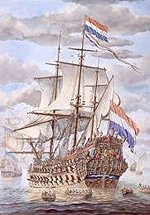
HOORN - 2002 marked the 400th anniversary of the formation of the Dutch East India Trading Company (VOC). To celebrate this momentous event many activities were organized in the six former VOC-cities in The Netherlands (Amsterdam, Middelburg, Delft, Rotterdam, Hoorn and Enkhuizen).
COMPOSITION COMPETITION
One of the activities was an international composition competition organized by the society 'Het Carillon te Hoorn'. Composers were invited to write one or more new contemporary pieces. Although the form and style of the work were free, it was required that the work should be based on VOC songs, without necessarily following them note-for-note, and that the new pieces should be playable on instruments in meantone temperament.
All submitted compositions were reviewed and judged by a judging-committee consisting of Peter Bremer (chairman, musicologist, carillonneur), Wim Franken (composer, carillonneur), Mathieu Dijker (composer, carillonneur), Carl Van Eyndhoven (teacher at the Lemmens-institute in Leuven, organist, carillonneur), and Geert Bierling (organist, carillonneur). Pieces were judged for their originality, musicality and suitability for carillon.
FIRST PRIZE
The first prize of EUR 1.815,00 was awarded to Geert D'hollander from Antwerp (Belgium). The jury was unanimous in their decision, awarding his work Een Aangename Voois - a fantasy in three parts- the prize as best piece submitted. Mathieu Dijker, member of the jury, wrote in his report: "This composition really demonstrates a skillful writing on various levels, with sections that are unified yet contrasting, with thematic control and development, resulting in a carillon that dreams and laughs and sings and is completely highlighted."
The second best submission, entitled 'Parafrase', was composed by Johan Adriaenssen (Norway). The third piece chosen by the jury was Cantio matutina, written by Radek Rejsec from Prague (Czech Republic).
Entries for the contest were received from sixteen composers in The Netherlands, the Czech Republic, Norway, Belgium, the United Kingdom,and the USA. With financial support of the city of Hoorn, the Society 'Het Carillon van Hoorn' has published the six top entries in the 'Hoorns VOC-beiaardboek'.
CARILLON COMPETITION
The price-winning composition of Geert D'hollander was also the compulsory work for an international carillon competition. This contest, organized by the city of Enkhuizen and the 'Enkhuizer Klokkenspel-Vereniging' (Carillon Society of Enkhuizen) in co-operation with the 'Nederlandse Klokkenspel-Vereniging' (Dutch Carillon Society), was held in Enkhuizen on June 22, 2002. It was the 75th competition held in the Netherlands since 1927.
The contest started on the carillon of the Zuidertower (52 bells in meantone temperament) with the ringing of the 'Fire Bell', cast by François and Pieter Hemony in 1648. Only three participants had entered the competition under category B (carillonneurs without diploma). The compulsory piece for this catagory was the Sweelinck Fantasie composed by Albert de Klerk. Five carillonneurs had enrolled for category A (carillonneurs with diploma). Along with pieces of their own choice, each played the Fantasy on Een Aangename Voois, the new composition by Geert D'hollander.
A moderate sunshine accompanied the jury, public and participants late that afternoon during their walk to the lightweight carillon of the Drommedaris (39 bells in meantone temperament). There, three carillonneurs demonstrated their skill in improvising on a compulsory song selected by the jury.
Members of the jury were Peter Bremer (chairman, musicologist, carillonneur), Roel Smit (carillonneur, organist and choir-master), Koen Van Assche (carillonneur), Frank Meijer (carillonneur) and Peter Plompen (pianist, composer).
PRIZEWINNERS
The mayor of Enkhuizen, Mr. S.P.M. de Vreeze, presented the prizes. Wim Ruitenbeek from Nijkerkerveen was awarded the first prize in category A. Winner of the second prize was Mathieu Polak from Driebergen. Malgosia Drzewiecka from Gdansk (Poland) won first prize in category B, with second prize going to Jasper Stam from Kampen. The jury considered the improvisation of Gijsbert Kok from Bodegraven the best and credited him with the Dr. Van der Elst-bell, the exchange prize for this category.
DUTCH EAST INDIA TRADING COMPANY
In the 17th and 18th century companies were established in several European countries with as goal trading with Southern and East Asia. These companies were authorized to build military fortifications and conclude treaties, as well as holding trading monopolies in territories assigned to them.
In The Netherlands the East India Trading Company (Dutch abbreviation: VOC) was established March 20, 1602. The government authorized the VOC to hold a trading monopoly for the territory between the Cape of Good Hope andthe Strait of Magalhaes. The company consisted of six Chambers (Amsterdam, Middelburg, Delft, Rotterdam, Hoorn, Enkhuizen). Amsterdam had within the VOC a large authority, but in the board of the 'Heren Zeventien', the governing body, not an absolute majority of votes.
The VOC was mainly a trading company. Large profits were made on spice from the Moluccas. Furthermore great amounts of cotton and silk materials came from Indonesia. Later on the market of Amsterdam was also able to trade coffee.
Since 1619 the VOC was managed from Batavia (nowadays Jakarta) in Indonesia. In order to maintain their positions over against competitors and local enemies the VOC had to act as a military power too. After several decades trading became less profitable and debts were accumulating. Only by intervention of the Dutch government a bankruptcy could be avoided. Ultimately the Dutch government took over the VOC in 1798, all debts and credits included.
